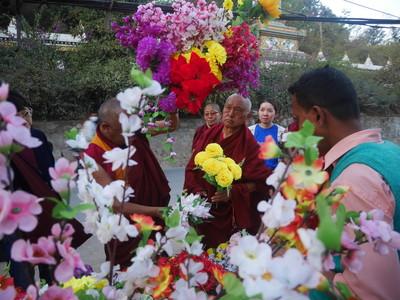When we shop with the lamrim, with renunciation, bodhicitta and right view, it becomes the cause of enlightenment. With bodhicitta, our shopping is only for others; all our activities are only for others. Whatever we do in our daily life, when we do it with bodhicitta, it is only for others. So, all this shopping becomes the cause of enlightenment. I’m using this as an example, but all our activities in daily life done with bodhicitta become the cause of enlightenment.
Everything becomes Buddhadharma with renunciation, right view and bodhicitta. And when it is done with the meditation on emptiness, it becomes the antidote to samsara. In that way, our shopping becomes the antidote to samsara. Walking, sightseeing, it’s the same—it becomes the antidote to samsara; it doesn’t become the cause of samsara.
When we do a sadhana and we visualize the deity, if we do it with the emptiness meditation and an awareness of dependent arising, how because it arises dependently, it exists in mere name, merely imputed by mind, or if we look at it as a hallucination—although it appears as something real, we look at that which is hallucination as a hallucination—if we do that, it becomes the antidote to samsara; it doesn’t become the cause of samsara. Otherwise, there is the danger of it becoming the cause of samsara. Here, even doing our tantric practice becomes the antidote to samara.
Any normal activities we do, like eating food—if, while we are eating food, we meditate on how the I, action of eating and the object, the food, exist in mere name, merely imputed by mind, or if we look at everything that appears to us as something real and see it as a hallucination, how the food, ourselves as the eater and the action of eating all appear real while we understand that all these, which are hallucinations, we look at them as hallucinations, that is the antidote to samsara. What comes in the heart is that these are all empty. Even without thinking they are empty but looking at them as hallucinations—which they are—the result is to feel in our heart that these are empty. So, again, eating food becomes pure Dharma; it becomes the antidote to samsara.
Similarly, while we are working. I’ll mention this but keep it short. I mentioned being in a meeting as an example, but also, while we are cleaning, cooking, writing, being a secretary, even if it doesn’t happen continuously, we should try to remember from time to time with mindfulness of the gag cha or of dependent arising, looking at things as empty. Even if we cannot continuously develop that mindfulness, we should try to remember again and again.
All those times that we work like that, even doing secretarial work, that mind of emptiness becomes the antidote to samsara; it becomes the heart of the 84,000 teachings of the Buddha, the heart of lamrim.
It becomes the antidote to the root of samsara. Every time we do it, it leaves more and more imprints until we have a realization of emptiness. It is imaginary at first, then later we have the direct perception, which ceases karma and delusions, ceasing first the gross negative imprints of delusions, then the subtle ones. Then, with bodhicitta we create a lot of merits with six paramitas, the deeds of the bodhisattva, and we are able to cease the subtle negative imprints, thus achieving enlightenment.
This is how to integrate the Dharma in our busy life, the entire lamrim practice and the three principal aspects of the path. Here, I’m particularly talking about emptiness at this point.
Then, we will constantly have peace in our heart. Negative emotional thoughts will not arise, such as fear, attachment, depression, all these. We are always calm, peaceful, with an open heart, not a closed one. We have a very healthy mind, a very open heart; we have space to generate loving kindness and compassion for others. When there are minds like anger or attachment, they block the development of compassion, the pure, unconditional loving thought.































